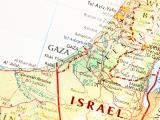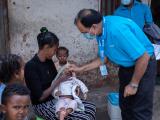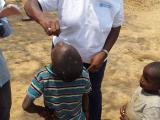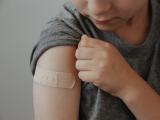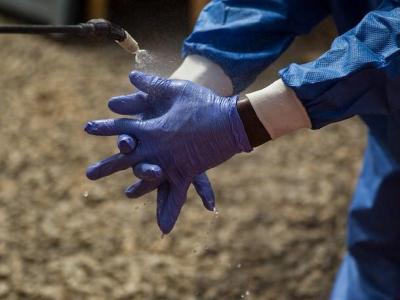The United Nations Security Council has been asked to help jump-start polio vaccination efforts in Sudan following a breakdown in negotiations between the country's government and a rebel group that would have allowed a planned immunization campaign to move forward last week.
Recent polio outbreaks in Horn of Africa countries have put Sudan and South Sudan at risk, which has prompted fresh rounds of vaccination against the disease. Health officials from Middle East nations, the world's other polio hotspot, have also raised concerns about the situation in the Horn of Africa, which they say could threaten nations such as Djibouti that are close to their countries.
A 2-week vaccination campaign was slated to begin on Nov 5 in Sudan's South Kordofan and Blue Nile states, areas are under control of a rebel group, the Sudan People's Liberation Movement-North (SPLM-N), according to a Nov 11 UN report. However, the report said Sudan's government and the SPLM-N haven't been able to resolve their differences over the campaign's technical plans.
John Ging, who directs the UN's Office for the Coordination of Humanitarian Affairs (OCHA), said at a press conference that the UN is ready if it gets the signal from Sudan to proceed. "Sadly, and typically, since the council passed its resolution calling for unfettered humanitarian access, once again we don't have any access at all."
Liu Jieyi, a UN representative from China who is Security Council president this month, said on Nov 11 after closed-door meetings on Sudan and South Sudan, that the delay in polio vaccination is worrisome. "It is an issue that bears on the well-being of children. Children are the future. So we do hope that the conditions will be there so that this polio vaccination campaign can go ahead."
Sudan's government declared a unilateral halt to hostilities from Nov 1 to Nov 12 to pave the way for the polio vaccination campaign but has refused to meet with rebels to discuss the technical details, the Sudan Tribune reported yesterday. Meanwhile, the SPLM-N has insisted on a negotiated accord and an agreement on the transportation of the vaccines, and they have rejected the government's humanitarian body in the process, according to the report.
In early October the World Health Organization (WHO) announced it was investigating three suspected wild poliovirus type 1 (WPV-1) infections in South Sudan, tho of which involve girls with paralysis symptoms who are from a state that borders Sudan. The WHO said health officials were assessing immunization rates in neighboring Sudan and Uganda to gauge population immunity levels.
The officials added that plans were under way to shore up gaps with immunization campaigns, including ones in November and December in Sudan. Media reports have said the goal of the delayed campaign was to reach 165,000 children in the two states.
The two groups issued statements yesterday accusing each other of blocking the vaccination campaign, according to the Tribune.
WHO outlines Syria response priorities
In other developments, a broad outbreak response is under way in the Middle East following the confirmation of 13 cases so far in Syria, and health officials from the WHO's Eastern Mediterranean Regional Office (EMRO) recently issued a resolution declaring polio eradication an emergency, according to a WHO statement today.
The statement said mass vaccination campaigns are in progess in seven countries and territories, with more extensive efforts planned for December that will target 22 million children.
The WHO said the vaccination plan is part of the bigger humanitarian assistance effort for war-torn Syria. "This includes vaccinating all Syrian children no matter where they are, whether in government or contested areas, or indeed outside of Syria," the WHO said, noting that the first priorities are to resupply and reactive the necessary health infrastructure, which includes redeploying health workers to take vaccine to the worst-affected areas and across conflict lines, when needed and possible.
The broader campaign across the rest of Syria and neighboring countries is expected to last at least 6 to 8 months, depending on outbreak developments, the WHO said.
The joint resolution from the EMRO nations came during EMRO's annual meeting, which recently concluded in Muscat, Oman. It also included a request for Pakistan to intensify steps to ensure that all children are vaccinated, especially in the federally administered tribal areas, as an urgent step to curb further international spread of the disease. Earlier this week the WHO said genetic sequencing tests of the WPV-1 strain isolated in the Syrian outbreak revealed that its closest match was a virus found during environmental sampling in Egypt, which had previously been linked to WPV circulating in Pakistan.
Middle East health officials also asked for enhanced coordination with the WHO's African Region to ensure stepped-up efforts to quickly interrupt the outbreak in the Horn of Africa countries, especially Somalia, and to protect at-risk areas that border EMRO countries, especially Djibouti, Sudan, and Yemen.
Pakistan polio cases pass 2012 total
In related developments, a senior health official from Pakistan said today that the number of polio infections this year has now surpassed the number of cases reported in 2012, Agence France-Presse (AFP) reported.
The official said 62 cases have been reported so far in 2013, compared with 58 in all of 2012. Militant groups in Pakistan oppose polio vaccination efforts and have waged attacks on immunization teams in some parts of the country.
See also:
Nov 13 WHO statement
Oct 30 WHO EMRO statement
October WHO EMRO resolution
Nov 11 UN News Centre report
Nov 13 AP story
Nov 12 Sudan Tribune story
Oct 1 WHO statement on polio in the Horn of Africa
Nov 13 AFP story


